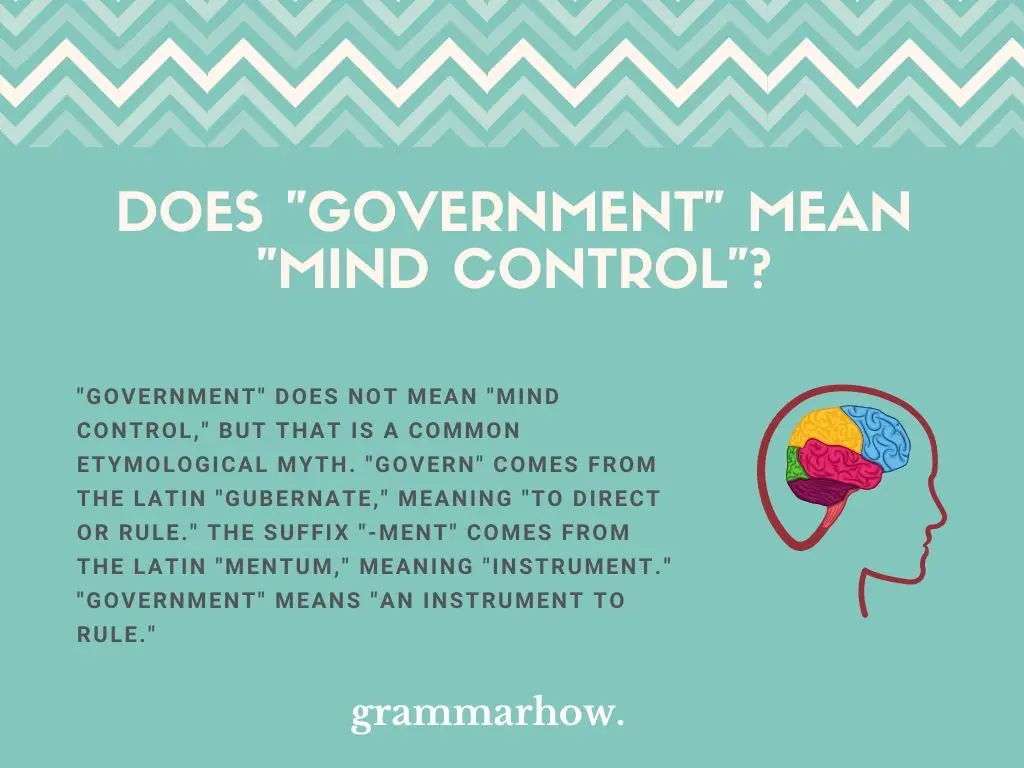The root word for “government” causes an interesting discussion when you get into the origins. We can take it back to Latin to find out what it means. In this article, we’ll take a look at what “government” means and how it came to be what it is today.
Does “Government” Mean “Mind Control”?
“Government” does not mean “mind control,” but that is a common etymological myth. “Govern” comes from the Latin “gubernate,” meaning “to direct or rule.” The suffix “-ment” comes from the Latin “mentum,” meaning “instrument.” “Government” means “an instrument to rule.”

According to The Cambridge Dictionary, the definition of “government” is “the group of people who officially control a country.”
We can combine the original Latin meaning and the current meaning to show that the “instrument” in question is “the group of people.” The “ruling” is linked to “officially controlling a country.”
Origin Of The Word “Government”
So, “government” doesn’t mean “mind control” in Latin. However, we can take a further look at the Latin origins to try and work out exactly what it does mean and where the word came from.
Language evolution is an incredibly interesting topic. It helps non-native speakers learn a lot about root words and other variations of words based on what we know about the origin.
What Is The Latin Word For “Government”?
First, let’s talk about the Latin word for “government.” As we’ve stated previously, we’re able to break the Latin down into two main parts.
“Gubernate” is the Latin word meaning “to direct” or “to rule.” It is the first portion of the word and evolved to “govern” in modern-day English. “-Ment” is the suffix at the end of the word, and in Latin, it means “instrument.”
Many people think that the “-ment” suffix has a lot more to do with the mind. However, this is a common confusion that people make. It makes sense since it allows people to have a go at the government, but no matter how hard you want that to be the case, the “government” isn’t capable of “mind control.”
Old French Development
Old French is where the language developed next. We started to get a little more familiar with “government” as we know it today.
In Old French, “gubernate” turned into “governer,” which meant “to direct or rule” in the same way. This is much closer to our English counterpart today. Old French also used “-mentum” as a suffix to mean instrument.
However, Old French also explains a little more about why so many people were confused about the relationship between “-ment” and “mind.”
In Old French, they have two main suffixes that could have been applied to the final meaning of government:
- “-ment” means “mind,” meaning that anything with the suffix “-ment” means it was connected to the mind.
- “-mentum” means “instrument,” meaning that anything with the suffix “-mentum” means it is an instrument of some kind.
In this case, it doesn’t have to be a musical instrument. It’s referring to using the government in a way to be able to direct and rule a country (which incidentally is precisely what the government is used for today).
Modern Meaning
As you can see from the development of the word, we now have “governer” and “mentum,” meaning “an instrument to direct.” Both of those phrases are Old French, though, so we need to modernize them.
“Governer” in Old French became “govern” in English, meaning “to direct or rule.” “Mentum” as a suffix became “-ment,” though it is still used to mean “instrument.”
We simply combined “govern” and “-ment” to end up with the result we have today. Now “government” still means “an instrument to direct or rule;” it’s just more streamlined and localized for English speakers to understand.
Why Do People Ask If “Government” Means “Mind Control”?
So, what exactly was it that made people believe “mind control” and “government” were synonymous?
“-Ment” as a suffix means “mind” in both Latin and Old French. People believed that was the suffix we used to develop “government.” However, we actually used the suffix “-mentum,” meaning instrument, and simply shortened it to suit our needs.
Of course, some people will never accept that explanation, but it is the truth.

Martin holds a Master’s degree in Finance and International Business. He has six years of experience in professional communication with clients, executives, and colleagues. Furthermore, he has teaching experience from Aarhus University. Martin has been featured as an expert in communication and teaching on Forbes and Shopify. Read more about Martin here.
